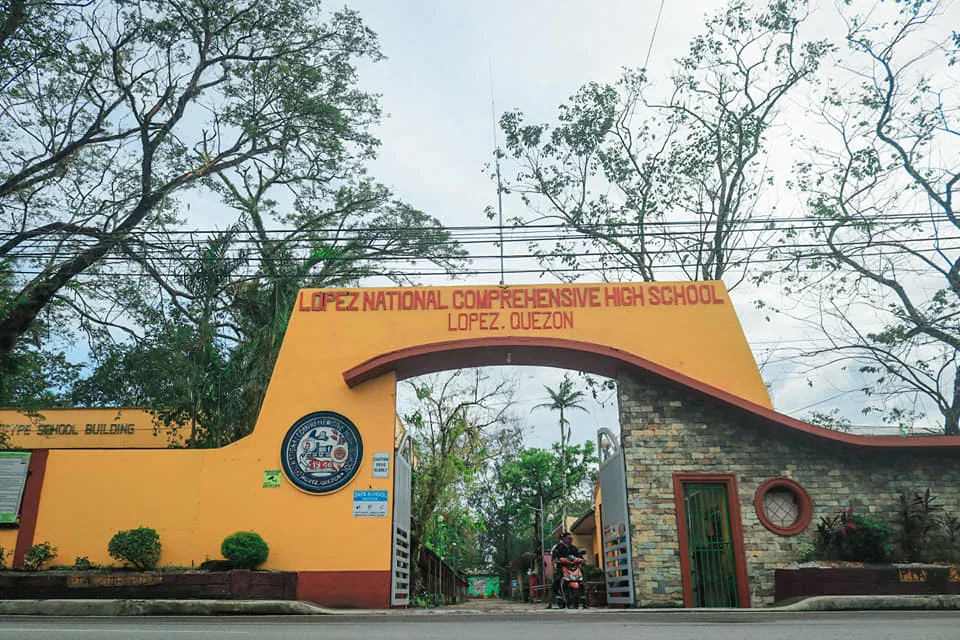By Nimfa Estrellado Lopez National Comprehensive High School (Photo from Deped Tayo Lopez NCHS - Quezon Province) LUCENA CITY, Quezon – ...
 |
| Lopez National Comprehensive High School (Photo from Deped Tayo Lopez NCHS - Quezon Province) |
LUCENA CITY, Quezon – In response to the ongoing heatwave, several schools in Quezon province will be suspending in-person classes from April 8, 2024, to April 12, 2024.
The Department of Education (DepEd) Calabarzon region reinforces the adoption of modular distance learning (MDL) and preventive measures in schools due to extreme heat spells. Concerned by rising temperatures, this directive underscores student and teacher safety as paramount.
In a Regional Memorandum 233 released on April 1, 2024, DepEd Calabarzon reiterated the authority of school heads to suspend face-to-face (F2F) classes and shift to MDL when temperatures reach a heat index of 40 degrees Celsius or higher. Such readings come from sources like the Philippine Atmospheric, Geophysical, and Astronomical Services Administration (PAG-ASA) or through advisories from local government units (LGUs).
Extreme heat doesn't just pose physical risks; it can significantly impact students' ability to learn. When temperatures soar, concentration levels drop, and discomfort can make focusing on lessons nearly impossible. Suspending classes during extreme heat waves supports not only the physical safety of students and staff but also their cognitive well-being, ensuring a more conducive learning environment when they return.
While 40 degrees Celsius is the minimum threshold, school heads retain the flexibility to suspend F2F classes at lower temperatures should conditions become unbearable, posing a health hazard. A report must be submitted to the Office of the Superintendent.
School heads are advised to ensure classrooms are well-ventilated, provide access to potable drinking water, encourage learners and teachers to bring water bottles, and create shaded outdoor areas. Additionally, they should consider adjusting schedules such as starting classes earlier and shortening outdoor activities and working to address extremely high classroom temperatures.
The recent heatwaves highlight the potential health risks of extreme temperatures, with heat exhaustion and heatstroke being particular dangers. The Department's emphasis on safety measures and the option to transition to MDL demonstrate its commitment to protecting the educational community.
Parents and guardians are encouraged to ensure children stay hydrated, wear light-colored clothing, and avoid prolonged sun exposure outside of school hours. This shared community responsibility is vital for safeguarding student well-being.
Several schools have already taken action, including Guinayangan National High School in Guinayangan, Quezon, which has suspended afternoon classes until further notice, Casay National High School in San Francisco, Quezon, which has suspended morning classes due to student health and safety concerns, and Bondoc Peninsula Agricultural High School in Mulanay, Quezon, which has also suspended classes until further notice.
The whole country, not just Quezon Province, is experiencing challenges with school operations due to various health and safety concerns. It is important for schools to have contingency plans in place to address potential difficulties in the future.
This includes ensuring that proper health and safety protocols are in place, as well as establishing alternative methods of teaching and learning to adapt to changing circumstances. Schools must remain vigilant and proactive in order to continue providing quality education despite the challenges.
One netizen commented on the growing need to consider class suspensions due to extreme heat, highlighting the impact of climate change on Philippine schools.
It's crucial to recognize climate change's potential impact on educational institutions. Proactive measures, such as planting trees, providing shade, and considering alternative schedules during extreme weather, are important for ensuring the safety and well-being of students and staff.







No comments